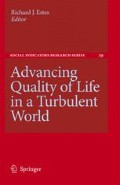Access this chapter
Tax calculation will be finalised at checkout
Purchases are for personal use only
Preview
Unable to display preview. Download preview PDF.
References
Anand, P., Hunter, G., and Smith, R. (2004). Capability and Wellbeing: Evidence based on the Sen-Nussbaum Approach to Welfare. Milton Keynes: The Open University.
Bank of Hawaii. (1998). Republic of the Marshall Islands (RMI): Economic and Policy Update. Honolulu: Bank of Hawaii.
Bikini Atoll Celebrations. (1999). Bikini Atoll: Remembering Our Homeland. Available at http://www.bikiniatoll.com\BikiniDay.
Butuna, J.B. (1999). Census of Population and Housing. Majuro, RMI: Office of Planning and Statistics.
Campbell, D.T. and Stanley, J.C. (1996). Experimental and Quasi-Experimental Designs for Research. Chicago, IL: Rand McNally.
Douglas, N. and Douglas, N. (eds.) 1994. Pacific Islands Yearbook. (17th edition), Suva: Fiji Times Ltd.
Economy of the Marshall Islands. (2004). Wikipedia. Available at http://en.wikipedia.org\wiki\. Economy of the Marshall Islands.
Erikson, R. et al. (eds.) (1987). The Scandinavian Model. Welfare States and Welfare Research. London: M.E. Sharpe, Inc.
Freedman, D.A. (1999). Ecological Inference and the Ecological Fallacy. Technical Report No. 549. Berkeley, CA: University of California Press.
Greenpeace and the Body Shop. (2003). Power to Tackle Poverty: Getting Renewable Energy to the World’s Poor. Available at http://www.choose-positive-energy.org.
Huck, S.W. (2000). Reading Statistics and Research (3rd edition), New York: Longman.
Hunter, R. (2003a). The UK Fuel Poverty Strategy. Executive Summary. London:Department of Trade and Industry.
Hunter, R. (2003b). The UK Fuel Poverty Strategy. Monitoring Progress. London: Department of Trade and Industry.
Hunter, R. (2003c). The UK Fuel Poverty Strategy. Common Measures for Tackling Fuel Poverty. London: Department of Trade and Industry.
Hunter, R. 2003d. The UK Fuel Poverty Strategy. The Causes and Effects of Fuel Poverty. London: Department of Trade and Industry.
Judd, C.M. et al. (1991). Research Methods in Social Relations (6th edition). New York: The Dryden Press.
King, G. (1997). A Solution to the Ecological Inference Problem. Princeton, NJ: Princeton University Press.
Konelios, M. (2001). Second National Economic and Social Summit. Majuro, RMI: Government Publications.
Laderchi, C.R. (1999). The Many Dimensions of Deprivation in Peru: Theoretical Debates and Empirical Evidence. Santiago, CA: Latin American Economic Association Meeting.
Laderchi, C.R. (2000). The Monetary Approach to Poverty: A Survey of Concepts and Methods. Oxford: Oxford University Press.
Laderchi, C.R. (2001a). Killing Two Birds with the Same Stone? The Effectiveness of Food Transfers on Nutrition and Monetary Poverty. QEH Working Paper Series— QEHWPS74. London: SAGE Publications.
Laderchi, C.R. (2001b). Participatory Methods in the Analysis of Poverty: A Critical Review. QEH Working Paper Series—QEHWPS62. Oxford: Queen Elizabeth House.
Laderchi, C.R., Saith, R., and Stewart, F. (2003a). Does it Matter that We Don’t Agree on the Definition of Poverty? A Comparison of Four Approaches. QEH Working Paper Series— QEHWPS107. Namibia: The Research Department of the Bank of Namibia.
Laderchi, C.R., Saith, R., and Stewart, F. (2003b). Everyone Agrees We Need Poverty Reduction, But not What This Means: Does This Matter? Wider Conference on Inequality, Poverty and Human Wellbeing, Helsinki.
Mukherjee, R. (1989). The Quality of Life: Valuation in Social Research. New Delhi: Sage Publications.
Nussbaum, M.C. and Sen, A. (eds.) (1993). The Quality of Life. Oxford: Clarendon Press.
Power to tackle poverty: getting renewable energy to the world’s poor. Available at http://www.choose-positive-energy.org\docs\power2web-short%20version.pdf
Republic of the Marshall Islands (2005). Consumer Price Index. Economic Policy Planning and Statistics Office. Majuro, RMI.
Sen, A. (1985). Commodities and Capabilities. Amsterdam: Elsevier.
Sen, A. (2000). Capability and wellbeing. In S. Corbridge (ed.), Development Critical Concepts in the Social Sciences. Cornwall: Routledge, p. 1.
Singh, J. (1995). The multivariate analysis of fishing patterns in the Coral Islands of Central Pacific. Man and Culture in Oceania, 11:95–111.
Singh, J. (2002). Bikini: The Lost Paradise. 2nd International Congress of Sociology. Aristotle University of Thessaloniki, Greece. Paper published in and available at http://users.auth.gr\~ikonomu\november2002\main\sessionsen.html#21.
Social and Environmental Dimensions of Developing Country Energy Production and Use. Available at http://www.areed.org\training\handbook\docs\chapter8.pdf
The Alliance for Energy and Economic Growth. Available at http://www.yourenergyfuture.org\aboutus.cfm
The Ecological Fallacy. Available at http://www.thernstrom.com\theecologicalfallacy.htm
The Ecological Fallacy. Available at http://jratcliffe.net\research\ecolfallacy.htm
The Eritrean Energy Sector. Available at http://www.punchdown.org\rvb\energy\Eng Sector.html
The Human Development Report: A Statistical Profile of Wealth and Inequality. Available at http://www.aph.gov.au\library\pubs\rn\1999-2000\2000rn12.htm
U.S. Department of State. (2002). ‘US Proposes Amended Compact of Free Association Funding for the Republic of the Marshall Islands’. Available at http://www.state.gov\p\eap\rls\
Editor information
Editors and Affiliations
Rights and permissions
Copyright information
© 2007 Springer
About this chapter
Cite this chapter
Singh, J. (2007). Fuel Sources and Well-Being in the Marshall Islands. In: Estes, R.J. (eds) Advancing Quality of Life in a Turbulent World. Social Indicators Research Series, vol 29. Springer, Dordrecht. https://doi.org/10.1007/978-1-4020-5110-4_7
Download citation
DOI: https://doi.org/10.1007/978-1-4020-5110-4_7
Publisher Name: Springer, Dordrecht
Print ISBN: 978-1-4020-5099-2
Online ISBN: 978-1-4020-5110-4
eBook Packages: Humanities, Social Sciences and LawSocial Sciences (R0)

